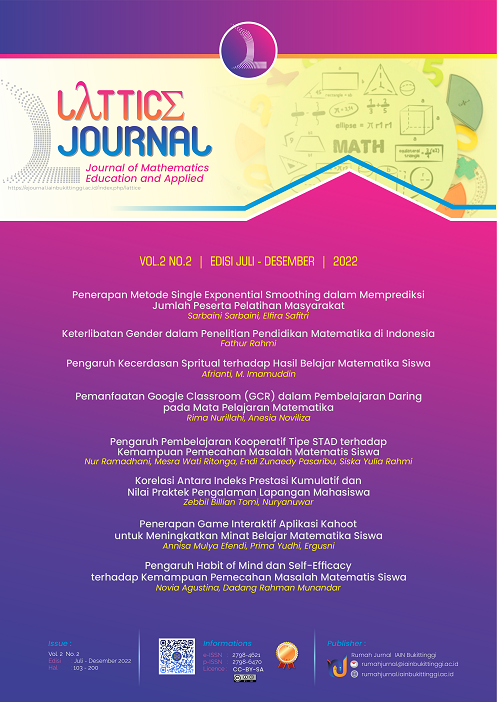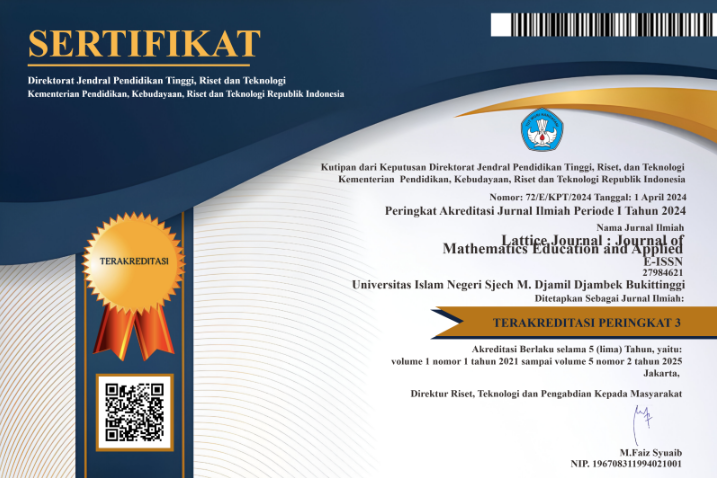Pengaruh Habit of Mind dan Self-Efficacy terhadap Kemampuan Pemecahan Masalah Matematis Siswa
DOI:
https://doi.org/10.30983/lattice.v2i2.5954Keywords:
Habit of Mind, Self-Efficacy, Pemecahan Masalah Matematis.Abstract
Tujuan penelitian ini adalah mengetahui pengaruh habit of mind dan self-efficacy terhadap kemampuan pemecahan masalah matematis siswa. Pendekatan yang digunakan adalah kuantitatif dengan metode ex post facto. Populasi dalam penelitian ini yaitu seluruh siswa kelas VIII di salah satu SMP di Kota Bekasi. Sampel yang diambil berjumlah 69 siswa. Instrumen yang digunakan adalah tes berbentuk soal uraian tentang kemampuan pemecahan masalah, angket habit of mind, dan angket self-efficacy. Analisis regresi linear sederhana dan berganda digunakan untuk menganalisis data pada penelitian ini. Berdasarkan hasil penelitian dapat diambil kesimpulan bahwa terdapat pengaruh habit of mind terhadap kemampuan pemecahan masalah matematis yaitu sebesar 22,1%, terdapat pengaruh self-efficacy terhadap kemampuan pemecahan masalah matematis yaitu sebesar 22,9%. Selanjutnya, terdapat pengaruh habit of mind dan self-efficacy terhadap kemampuan pemecahan masalah matematis yaitu sebesar 34,7%. Dengan demikian, diperoleh bahwa habit of mind dan self-efficacy berpengaruh signifikan terhadap kemampuan pemecahan masalah matematis siswa.
References
Ernawati, R. Zulmaulida, E. Saputra, and M. Irham, Problematika Pembelajaran Matematika. Yayasan Penerbit Muhammad Zaini, 2021.
U. Umbara, Psikologi Pembelajaran Matematika (Melaksanakan Pembelajaran Matematika Berdasarkan Tinjauan Psikologi). Deepublish, 2017.
G. Roebyanto and S. Harmini, Pemecahan Masalah Matematika, 1st ed. Remaja Rosdakarya PT, 2017.
N. C. of T. of M. NCTM, Principles and Standards for Schools Mathematics. 2000.
R. Rezita and T. Rahmat, “Hubungan Disposisi Matematis dengan Kemampuan Pemecahan Masalah pada Mata Pelajaran Matematika,†Lattice J. J. Math. Educ. Appl., vol. 2, no. 1, p. 79, 2022, doi: 10.30983/lattice.v2i1.5062.
H. Susanto, Pemahaman Pemecahan Masalah Berdasarkan Gaya Kognitif. Deepublish, 2015.
J. Ermita, “Pengaruh Kemandirian Belajar terhadap Kemampuan Pemecahan Masalah Matematika Siswa Kelas VIII SMP Negeri 7 Lubuk Basung,†Lattice J. J. Math. Educ. Appl., vol. 1, no. 1, p. 24, 2022, doi: 10.30983/lattice.v1i1.4971.
M. Bernard, N. Nurmala, S. Mariam, and N. Rustyani, “Analisis Kemampuan Pemecahan Masalah Matematis Siswa SMP Kelas IX Pada Materi Bangun Datar,†SJME (Supremum J. Math. Educ., vol. 2, no. 2, pp. 77–83, 2018, doi: 10.35706/sjme.v2i2.1317.
Y. Gusmania and Marlita, “Pengruh Metode Discovery Learning terhadap Kemampuan Pemecahan Masalah Matmatis Siswa Kelas X SMAN 5 Batam Tahun Pelajaran 2014/2015," Pythagoras, vol. 5, no. 2, pp. 151–157, 2016.
G. Polya, How to Solve It. New Jersey: Pricenton University Press, 1995.
P. Akbar, A. Hamid, M. Bernard, and A. I. Sugandi, “Analisis Kemampuan Pemecahan Masalah Dan Disposisi Matematik Siswa Kelas Xi Sma Putra Juang Dalam Materi Peluang,†J. Cendekia J. Pendidik. Mat., vol. 2, no. 1, pp. 144–153, 2017, doi: 10.31004/cendekia.v2i1.62.
H. D. Putra, N. F. Thahiram, M. Ganiati, and D. Nuryana, “Kemampuan Pemecahan Masalah Matematis Siswa SMP pada Materi Bangun Ruang,†JIPM (Jurnal Ilm. Pendidik. Mat., vol. 6, no. 2, p. 82, 2018, doi: 10.25273/jipm.v6i2.2007.
D. V. Anggraini, “Hubungan Antara Mathematics Anxiety Dan Habits Of Mind Pada Masa Pandemi Covid-19 Dengan Kemampuan Pemecahan Masalah Matematis Siswa Mts Negeri 1 Pangkalpinang,†Universitas Muhammadiyah Prof Dr Hamka, 2020.
G. Dwirahayu, D. Kustiawati, and I. Bidari, “Pengaruh Habits of Mind Terhadap Kemampuan Generalisasi Matematis,†J. Penelit. dan Pembelajaran Mat., vol. 11, no. 2, pp. 1–13, 2018, doi: 10.30870/jppm.v11i2.3757.
A. R. Darmanita and A. Khair, “Hubungan Kebiasaan Belajar Terhadap Prestasi Belajar Matematika SD,†vol. 001, no. 1, 2017.
A. Mawardi, “Pengaruh Minat dan Kebiasaan Belajar terhadap Kemampuan Pemecahan Masalah Matematika ( Survei Pada SMP Swasta di Kabupaten Bekasi ),†vol. 2, no. 2, pp. 171–178, 2019.
Asra, “Pengaruh Self Concept Matematis Habit Of Mind Dan Kepercayaan Diri Terhadap Hasil Belajar Matematika Siswa Kelas VII SMP Unismuh Makassar,†2018.
A. Subaidi, “Self-efficacy Siswa dalam Pemecahan Masalah Matematika,†Sigma, vol. 1, no. 2, pp. 64–68, 2016, [Online]. Available: doi: http://dx.doi.org/10.0324/sigma.v1i2.68.
A. Bandura, W. H. Freeman, and R. Lightsey, “Self-Efficacy: The Exercise of Control,†Journal of Cognitive Psychotherapy, vol. 13, no. 2. pp. 158–166, 1999, doi: 10.1891/0889-8391.13.2.158.
N. Indriani, E. Rukmigarsari, and S. S. Faradiba, “Pengaruh Self Efficacy Dan Independent Learning Terhadap Kemampuan Pemecahan Masalah Matematis Siswa Pada Materi Statistika Kelas Viii Smp Ybpk Pujiharjo,†J. Penelitian, Pendidikan, dan Pembelajaran, vol. 16, no. 30, pp. 107–111, 2022, [Online]. Available: http://riset.unisma.ac.id/index.php/jp3/article/view/14694.
D. Pratiwi, M. Suendarti, and Hasbullah, “Pengaruh Efikasi Diri Dan Kemandirian Belajar Terhadap Kemampuan Pemecahan Masalah Matematika,†JKPM (Jurnal Kaji. Pendidik. Mat., vol. 5, no. 1, p. 117, 2019, doi: 10.30998/jkpm.v5i1.5329.
Sugiyono, Metode Penelitian Kuantitatif, Kualitatif, dan R&D. Bandung: Alfabeta, 2017.
A. Mutia, “Pengaruh Self-Efficacy Terhadap Motivasi belajar Matematika Siswa Kelas VIII SMPN 4 Bathin Solapan Pelajaran 2020/2021,†Institut Agama Islam (IAIN) Bukit Tinggi, 2021.
A. Kurniasari, “Pengembangan Pembelajaran Novick Dengan Strategi Mathematical Habits Of Mind Untuk Meningkatkan Kemampuan Berpikir Kreatif Siswa,†Universitas Islam Negeri Sunan Ampel Surabaya, 2018.
I. A. V. Yandari, S. Supartini, A. S. Pamungkas, and E. Khaerunnisa, “The Role of Habits of Mind (HOM) on Student’s Mathematical Problem Solving Skills of Primary School,†Al-Jabar J. Pendidik. Mat., vol. 10, no. 1, pp. 47–57, 2019, doi: 10.24042/ajpm.v10i1.4018.
N. Nurmala, E. E. Rohaeti, and R. Sariningsih, “Pengaruh Habits of Mind (Kebiasaan Berpikir) Terhadap Pemecahan Masalah Matematik Siswa Smp,†J. Educ., vol. 1, no. 2, pp. 163–168, 2018, [Online]. Available: https://www.jonedu.org/index.php/joe/article/view/41.
L. Moma and W. O. Dahiana, “Pengembangan Habits Of Mind Matematis Mahasiswa Dalam Perkuliahan Geometri Analitik Ruang,†Pros. SEMNAS Mat. Pendidik. Mat. IAIN Ambon, pp. 142–150, 2018.
S. Somawati, “Peran Efikasi Diri (Self Efficacy) terhadap Kemampuan Pemecahan Masalah Matematika,†J. Konseling dan Pendidik., vol. 6, no. 1, p. 39, 2018, doi: 10.29210/118800.
Downloads
Published
How to Cite
Issue
Section
Citation Check
License
Copyright (c) 2022 Novia Agustina, Dadang Rahman Munandar

This work is licensed under a Creative Commons Attribution-ShareAlike 4.0 International License.
Authors who publish with Lattice Journal : Journal of Mathematics Education and Applied agree to the following terms: Authors retain copyright and grant the Lattice Journal : Journal of Mathematics Education and Applied right of first publication with the work simultaneously licensed under a Creative Commons Attribution License (CC BY-SA 4.0) that allows others to share (copy and redistribute the material in any medium or format) and adapt (remix, transform, and build upon the material) the work for any purpose, even commercially with an acknowledgement of the work's authorship and initial publication in Lattice Journal : Journal of Mathematics Education and Applied. Authors are able to enter into separate, additional contractual arrangements for the non-exclusive distribution of the journal's published version of the work (e.g., post it to an institutional repository or publish it in a book), with an acknowledgement of its initial publication in Lattice Journal : Journal of Mathematics Education and Applied. Authors are permitted and encouraged to post their work online (e.g., in institutional repositories or on their website) prior to and during the submission process, as it can lead to productive exchanges, as well as earlier and greater citation of published work (See The Effect of Open Access).



